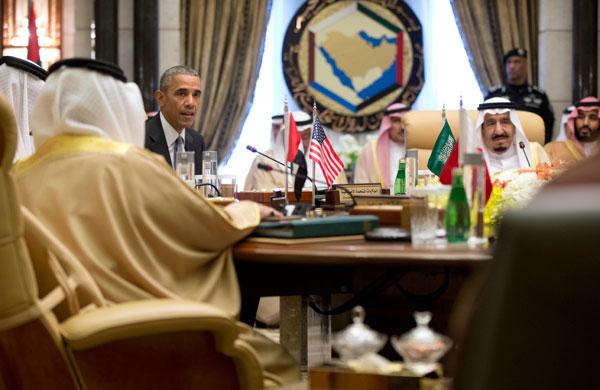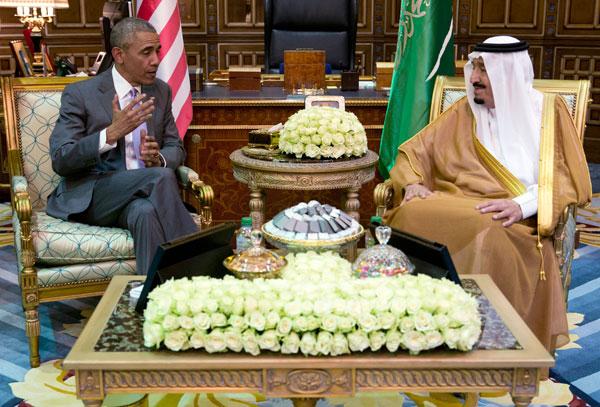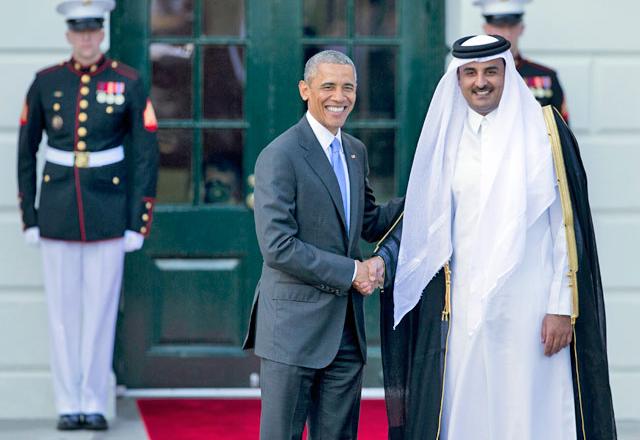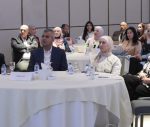You are here
Obama reaffirms US to deter aggression against Gulf Arabs
By Reuters - Apr 21,2016 - Last updated at Apr 21,2016

President Barack Obama, with Saudi Arabia’s King Salman (right), speaks after a Gulf Cooperation Council session at the Diriyah Palace during the Gulf Cooperation Council Summit in Riyadh, Saudi Arabia, Thursday (AP photo)
RIYADH — The United States will deter and confront aggression against Gulf Arab monarchies, who continue to have concerns about threats from Iran, President Barack Obama said after meeting their leaders to iron out strains in their alliance.
Obama came to Saudi Arabia hoping to allay Gulf states' fears over Iranian influence and encourage them to douse sectarian tensions in an effort to confront the threat posed by extremists like Daesh.
"I reaffirmed the policy of the United States to use all elements of our power to secure our core interests in the Gulf region and to deter and confront external aggression against our allies and our partners," the president said on Thursday after the summit with the Gulf Cooperation Council (GCC).
The president added in his statement that all leaders were committed both to the fight against Daesh and to de-escalating regional conflicts, and addressed the Gulf countries' concerns on Iran.
"Even with the nuclear deal we recognise collectively that we continue to have serious concerns about Iranian behaviour," Obama said.
There was no denying the strains that have afflicted ties between Washington and its Gulf partners, though, even as they have worked together on shared concerns such as the wars in Syria, Iraq and Yemen, however.
“What is true between the United States and the GCC, as is true with all of our allies and friends is that at any point of time there are going to be differences,” Obama said.
Footage and photographs aired on state media showed the leaders at a large circular table under a chandelier, with Obama sitting with King Salman on his left and the Abu Dhabi crown prince Sheikh Mohammed Bin Zayed Al Nahayan on his right.
Years of frustration among Gulf countries, aggravated by more recent stumbles, may have made Saudi Arabia and its regional allies less receptive to Obama on his fourth and most probably final trip to the kingdom.
The Middle East is mired in a contest for influence between a bloc of mostly Sunni countries, including the conservative, pro-Western Gulf monarchies, and revolutionary Shiite Iran and its allies.
Most of the GCC states have been bitterly disappointed in Obama’s presidency, during which they believe the United States has pulled back from the region, giving more space to Iran. They were also upset by Obama’s remarks in a magazine interview that appeared to cast them as “free-riders” in US security efforts and urged them to “share” the region with Tehran.
“On the core issues, there’s agreement about where we want to go,” Ben Rhodes, Obama’s deputy national security adviser, told reporters at a briefing in Riyadh.
He said strains in ties in recent years reflected differences over tactics rather than goals. “This summit allows us to align our approaches and strategies,” he said.
Clearing the air
Rhodes said a two-hour meeting with Saudi Arabia’s King Salman on Wednesday was the longest the two leaders had shared and included a “very open and honest discussion” that included issues which were a source of tension, without specifying them.
“I think they both agreed that it was good to essentially have this opportunity to clear the air,” he said.
The American president has said he wants Gulf allies to offer more democratic reforms and improve human rights, and he discussed that with King Salman on Wednesday.
Adding to tensions is a bill proposed in US Congress to lift Riyadh’s immunity if any Saudi officials are found to have been involved in the September 11, 2001, attacks. Obama has said he opposes the bill because it could lead to cases directed against the United States in foreign courts.
The United States remains deeply enmeshed in Gulf security, cooperating closely with the monarchies to strengthen their armed forces and share intelligence aimed at countering militant groups.
“The GCC countries have extensively cooperated with us on counter terrorism, curbing the financing of terrorist activities,” Obama said after the summit.
The underlying strong relationship was underscored in a cartoon published on Thursday in the pan-Arab daily Asharq Al Awsat, owned by King Salman’s branch of the Al Saud ruling family.
It showed a Shiite cleric in black turban and robes, marked “Iran”, sweating with alarm as he read a newspaper headlined “Obama in Riyadh”.
All the Saudi newspapers published several pages of photographs of Obama’s meetings with King Salman and other princes.
In keeping with a noticeably low-key approach by Saudi Arabia’s government, however, neither that photo opportunity, nor the GCC meeting’s opening statements, were broadcast on live television, as has often been the case before.
Related Articles
RIYADH — US President Barack Obama met Saudi Arabia's King Salman on Wednesday to seek joint action on security threats including Iran and t
Saudi Arabia is satisfied with assurances from US President Barack Obama about the Iran nuclear deal and believes the agreement will contrib
President Barack Obama sought to reassure Persian Gulf nations on Thursday that the United States is committed to their security, insisting a nuclear deal with Iran would not leave them more vulnerable.


















